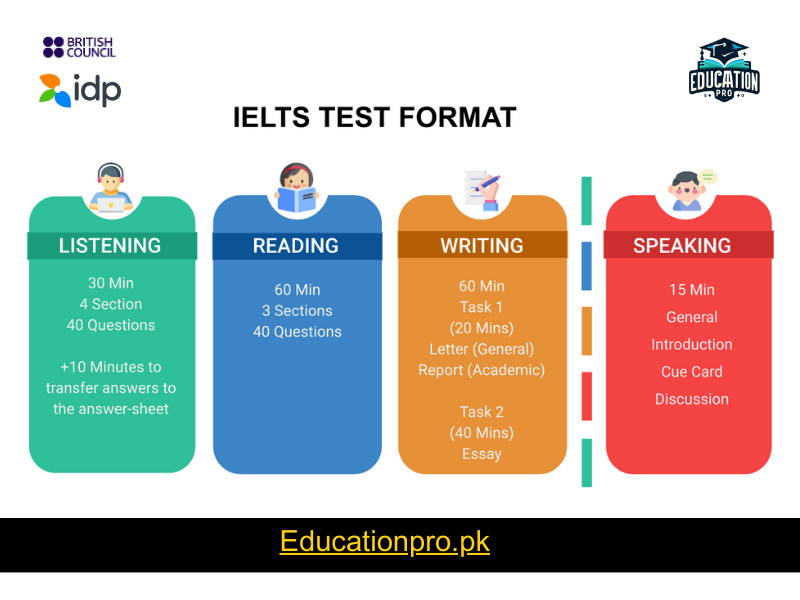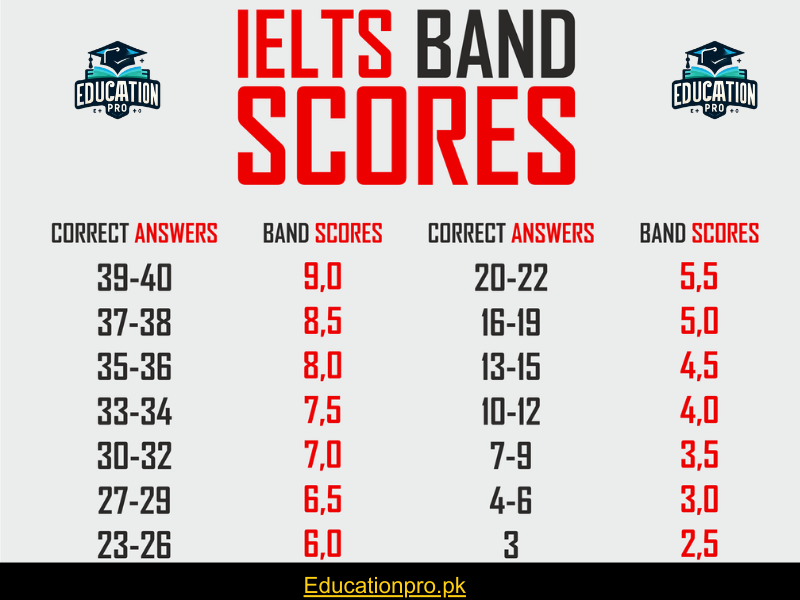IELTS Writing Test – The Ultimate Guide
Navigating through the IELTS Writing Test can seem overwhelming, but with the right guidance and a strategic approach, you can aim for a high band score. This comprehensive guide will furnish you with essential details about the test’s pattern, band distribution, and invaluable tips to assist IELTS test-takers, such as English language learners, college applicants, students, teachers, parents, tutors, and educational institutions.
Introduction
The International English Language Testing System (IELTS) is a highly regarded proficiency exam used by educational institutions, employers, and governments globally to assess an individual’s command of the English language. The writing component is one of the primary sections of the IELTS that gauges your ability to write clear, coherent, and contextually accurate English.
Pattern of the Writing Test
The IELTS Writing Test consists of two tasks, which differ slightly between the Academic and General Training versions.
Academic IELTS Writing
- Task 1 requires you to describe a graph, chart, map, or process in at least 150 words within 20 minutes.
- Task 2 asks you to write an essay in response to a point of view, argument, or problem in at least 250 words within 40 minutes.
General Training IELTS Writing
- Task 1 involves writing a letter, which may be formal, semi-formal, or informal, in at least 150 words within 20 minutes.
- Task 2 is an essay task, similar to the Academic module, to be completed in at least 250 words within 40 minutes.
Regardless of which version you take, quality of content, organization, vocabulary, and grammar are the cornerstones evaluated.

Bands Distribution of the Writing Module
The Writing Test is scored on a band scale of 1-9 based on four criteria:
- Task Achievement (Task 1) / Task Response (Task 2): This assesses how appropriately, accurately, and relevantly the response fulfills the requirements.
- Coherence and Cohesion: This looks at the overall clarity and fluency of your writing.
- Lexical Resource: This criterion evaluates the range of your vocabulary and the accuracy with which you use it.
- Grammatical Range and Accuracy: The examiners examine the variety and correct use of your sentence structures.
Each criterion contributes equally to your overall Writing score.

Helping Notes for Writing Module
To excel, consider these sectional tips:
- Task Achievement/Response: Be sure to address all parts of the task. Inclusive answers that cover every aspect of the question fare better.
- Coherence and Cohesion: Structure your paragraphs logically, and use cohesive devices (like linking words and pronouns) effectively.
- Lexical Resource: Avoid repetition by utilizing synonyms and showing a wide range of vocabulary.
- Grammatical Range and Accuracy: Diversify your sentence types and check for syntactic errors.
How To Prepare
- Understand the Format: Familiarize yourself with the nature of the tasks and the expected content.
- Practice Regularly: Draft essays and letters, and get feedback from seasoned teachers or use online platforms for evaluation.
- Enhance Your Vocabulary: Read rigorously in English and practice paraphrasing.
- Study Good Examples: Analyses high-scoring writing samples to understand what works.
- Time Management: Develop the ability to manage the given time effectively during the test.
Mock Tests: Simulate test conditions regularly to build stamina and confidence.
Sample Essay Topics
To help you prepare for the IELTS Writing Test, especially for Task 2, here are a selection of sample topics that you might encounter:
- Technology and Education
- Discuss the impact of digital learning platforms on conventional education systems.
- Environment and Sustainability
- Examine the effectiveness of international agreements in combating climate change.
- Healthcare
- The government should have the primary role in providing healthcare services. Agree or disagree?
- Work and Careers
- With the rise of remote working, will traditional office settings become obsolete?
- Culture and Society
- How does globalization affect national identities?
- Public Transportation
- Evaluate the significance of public transportation for a sustainable future.
- Youth and Education
- Should university education be made accessible to all students?
Remember, the key to excelling in the writing test is not only choosing a side or perspective but also presenting coherent arguments, supported by evidence, and articulated with a wide range of vocabulary and grammatical structures.
ielts writing, ielts writing task 1 , ielts writing task 2 , ielts writing practice,ielts advantage writing , ielts writing correction service , Educationpro.pk , ielts writing checker,ielts writing tutor , ielts general writing task 1 , writing task 1 , ielts writing test ,writing task 2 , ielts general writing , ielts writing practice test , ielts examples , ielts writing task 2 topics , ielts writing examples , ielts advantage writing task 2 , Educationpro.pk
Common Writing Mistakes
When preparing for the IELTS Writing Test, candidates often overlook common pitfalls that can affect their score. A frequent mistake is failing to fully answer the question or address every aspect of the task, which directly impacts the Task Achievement/Response score. Another common error is inconsistency in coherence and cohesion; this occurs when ideas are disjointed or paragraphs lack a logical flow. Mismanagement of time often leads to incomplete tasks or poorly developed arguments. Over-reliance on simplistic vocabulary or repetitive sentence structures can limit the Lexical Resource and Grammatical Range scores, while spelling and grammatical errors further detract from the overall impression of linguistic competence. Avoiding these common mistakes through mindful practice and attention to the task’s requirements is crucial for achieving a high score on the IELTS Writing Test.

Frequently Asked Questions
- Can I write over 250 words for Task 2?
- A. Yes, you can, but make sure you do not compromise quality with quantity.
- How strictly is spelling checked in the writing test?
- A. Spelling is an important criterion and misspellings can affect your score adversely.
- Can I use bullet points in IELTS Writing Task 1 or Task 2?
- A. It’s advisable to write in paragraphs. Bullet points may not present a well-developed response as required.
- How many paragraphs should I write for Task 2 essays?
- A. Generally, four to five paragraphs are sufficient, including an introduction, two to three body paragraphs, and a conclusion.
- Can I use contractions in the writing test?
- A. In Academic Writing, it’s best to avoid contractions to maintain formality. In General Training, contractions are acceptable for the letter in Task 1, depending on the required tone.
- How can I improve my grammar for IELTS writing?
- A. Study grammar rules, practice exercises, review corrections, and consider getting feedback from expert English users.
Remember that consistent practice and dedication are but a few steps towards excellence in your IELTS writing. Best of luck on your IELTS Writing Test.

